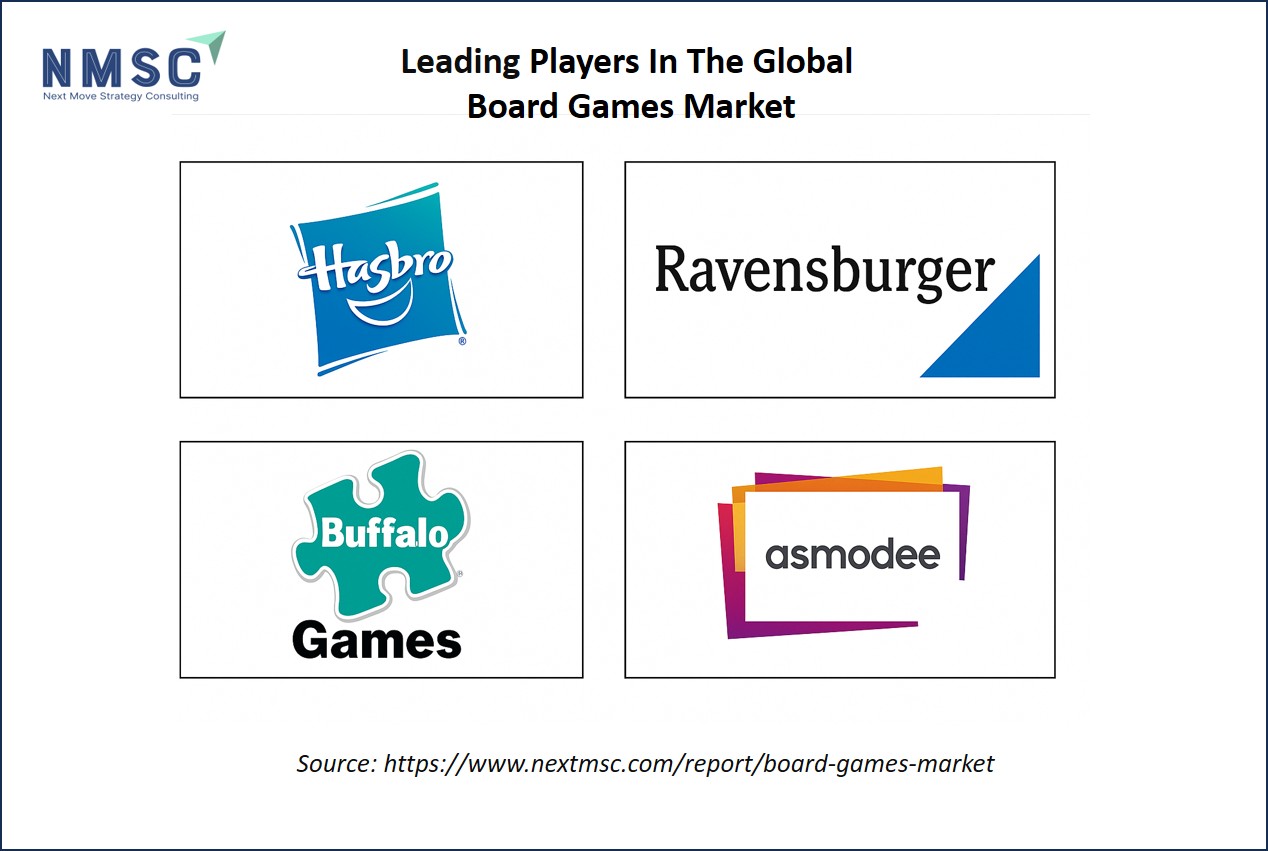What's Driving the Board Games Market Boom in 2025?
Published: 2025-09-10

The board games industry is experiencing a remarkable resurgence, captivating players across generations with innovative designs and social experiences. But what exactly is fueling this growth in 2024 and 2025?
From immersive gameplay to the rise of board game cafes, this blog explores the emerging trends shaping the global board games market, backed by credible data and insights. Let us dive into the key drivers, market projections, and actionable steps for enthusiasts and businesses alike.
Why Are Board Games Gaining Popularity?
The global Board Games Market is thriving, driven by a renewed interest in offline, social entertainment. According to a report by Next Move Strategy Consulting, the market is projected to reach USD 24.99 billion by 2030, growing at a compound annual growth rate (CAGR) of 8.7% from 2025 to 2030. This growth reflects a cultural shift toward interactive, screen-free activities that foster connection and creativity.
Key Drivers of Market Growth
-
Demand for Social Interaction: Board games offer a tangible, face-to-face experience, appealing to families and friends seeking quality time together. The collaborative nature of many board games fosters teamwork and understanding, allowing family members to support and learn from one another. Through the simple act of sitting around a table, engaged in friendly competition, families can experience a profound deepening of their bonds.
-
Reducing Screen Time: The digital world offers endless entertainment options, but excessive screen time is a growing concern, especially among parents. Board games offer a delightful and necessary respite, engaging players in a tactile, interactive experience. This break from digital devices allows families to connect in a more meaningful way, fostering conversations and interactions that might be lost in a more passive, screen-focused environment. It further helps alleviate the physical and mental strain associated with prolonged use of electronics, contributing to overall well-being.
-
Innovative Game Design: Developers are introducing strategy-based, cooperative, and immersive games with fresh themes, attracting diverse demographics. Gaming encourages players to set clear goals and objectives, working toward them systematically. Games also teach risk assessment, as players must weigh potential consequences and make informed decisions. Whether it be playing a card game like solitaire, or brain games like crossword puzzles, the skills one develop in gaming often translate well beyond the digital sphere.
-
Rise of Board Game Cafes: Venues like The Dice Box Café provide social spaces for players to explore new games without ownership. It’s dedicated Board Game Café where people can come together and play a variety of games from our library. Along with its huge game library, it also has rather an extensive menu of delicious food and drink on offer.
-
Innovation & Crowdfunding: Mizo Games, a Taiwanese board game company, began crowdfunding “2045” in August, which lets its players in a imaginary Chinese invasion 20 years in the future. In just two and a half months, it raised over T$4 million ($121,966) to fund the project. A player who took part in a test run of 2045 was quoted as saying, "I'm not very knowledgeable about military matters, so through this game, I learned where the army might land and launch an attack." The game gives players roles like Taiwanese army officers, Chinese sleeper agents, and volunteer fighters. It reportedly uses colourful action cards and role-playing to guide players through the events leading up to a made-up Chinese invasion of Taiwan.The game, which will also be available in US and Europe, is being launched as China increases military activity near Taiwan, including naval forces around the island.
The board games market is growing due to a blend of social, creative, and accessible factors. The focus on meaningful interactions and innovative designs ensures sustained interest across age groups.
How Are Game Mechanics Evolving?
Game mechanics are at the heart of the board games market’s evolution. Companies like Steamforged Games and Paradox Interactive are adapting complex digital games, such as Hearts of Iron, into strategy board games, letting players in CONTROL of History. These advancements cater to players seeking depth without overwhelming complexity.
Trends in Game Mechanics
-
Cooperative Gameplay: Games emphasizing teamwork, like cooperative role-playing games (RPGs), are gaining traction for their inclusive appeal. Most of the role-plays involve more than one individual who has to work together to achieve the target set or solve the problem. This cooperative nature of the game teaches teamwork and cooperation. Role-playing games can also provide kids with a space in which to fail and then learn from that. If a team fails at a mission or objective, they can understand what went wrong, and then they try it again with a better strategy. These aspects help the child be resilient, flexible, and problem-solver-all good things in any human's life.
-
Simplified Mechanics: Ravensburger’s Disney Villainous Unstoppable!, a new, fast-paced and easy-to-learn game, launched in 2025, targets families with accessible rules. Lysa Penrose, Head of New Games Marketing at Ravensburger told, “We know people love Villainous, but one of the most common things we hear from our fans is that they love the game’s immersion, artwork and style and wished there was an easy way to bring that joy to kids or families who might not have time to play a longer strategy game.”
-
Digital Integration: Hasbro’s digital and mobile app integrations, blend physical and digital play. One notable example of Hasbro’s integration of digital and physical play is the Nerf Nitro series, which combines the excitement of physical Nerf blasters with a digital app that tracks scores and challenges. Similarly, the Monopoly Deal app complements the classic board game with digital gameplay options, allowing players to enjoy the game in new ways. These innovations demonstrate Hasbro’s commitment to creating products that offer both tangible and digital experiences, appealing to a diverse audience. Hasbro’s success in adapting to the digital age by integrating physical and digital play is a testament to its innovative approach and deep understanding of consumer preferences. By leveraging technology and expanding into digital and media ventures, Hasbro has managed to stay at the forefront of the toy and entertainment industries.
Evolving game mechanics are making board games more engaging and accessible. From cooperative play to digital enhancements, these innovations broaden the market’s appeal.
Leading Manufacturers
The board games market is home to major companies like Hasbro Inc., Mattel Inc., Buffalo Games LLC, Days of Wonder, Masters Traditional Games, Ravensburger AG, Bored Game Company, Asmodee, CMON Limited, Ivory Graphics Ltd., Winning Solutions, Inc., Hachette Boardgames US, HBA USA, Gamescape North, Imago Group, among others.
What Role Do Board Game Cafes Play?
Board game cafes are transforming how players engage with games, offering curated spaces to explore vast libraries without purchasing. Originating as niche establishments, these cafes have proliferated, becoming beloved locales where people of all ages gather to unwind, compete, and connect over board games. The concept is simple yet brilliant: combine the warm, inviting atmosphere of a cafe with the engaging, strategic play of board games.
Impact of Board Game Cafes
Social Hubs: Venues like Draughts Café in London, with over 1,000 board games to choose from, mouth-watering food and drinks, and personalised birthday packages, foster community and discovery. With a distinctive atmosphere and a vast selection of board games, Draughts is the ideal venue for team-building exercises, workshops, and even networking events.
Mood Boost: Board games can release endorphins, those feel-good hormones that can help level out stress and anxiety.
Cognitive Exercise: Games like chess or Go are not just entertaining—they're brain boosters. Performing cognitive exercises can decrease the likelihood of dementia.
How Is E-commerce Shaping the Market?
The rise of e-commerce is making board games more accessible than ever. The International Trade Administration noted an 8% increase in global e-commerce retail sales from 2019 to 2020, with the trend continuing into 2024. This growth supports both major retailers and independent creators.
E-commerce Trends
Crowdfunding Platforms: Kickstarter and similar platforms empower indie developers, offering a visible platform to connect directly with potential fans and secure the necessary funds to bring their creative visions to life. One of Kickstarter's most remarkable features is its ability to help indie game developers build and engage with a dedicated community of supporters. Through regular updates, discussions, and rewards, developers can foster a sense of belonging among backers. This community becomes not just a source of funds but a powerful advocate for the game, spreading the word far and wide. Kickstarter allows developers to tap into the passion of their audience, transforming backers into enthusiastic promoters.
Global Reach: E-commerce enables small publishers to reach international markets, boosting diversity. The world of online shopping is booming, with 2.77 billion digital buyers expected in 2025 and global ecommerce sales reaching ₹607 trillion. With over 33% of the world’s population shopping online, expanding globally isn’t just an opportunity; it’s a strategic move to future-proof businesses and maximise growth potential.
Next Steps: How to Capitalize on These Trends
The board games market offers exciting opportunities for players, retailers, and creators. Here are actionable takeaways to leverage these trends:
-
Explore Board Game Cafes: Visit local cafes to discover new games and connect with communities, enhancing your gaming experience.
-
Support Crowdfunding Projects: Back innovative games on platforms like Kickstarter to access unique titles and support indie developers.
-
Leverage E-commerce: Shop online for convenience and variety, ensuring access to both mainstream and niche games.
-
Engage with New Mechanics: Try games with cooperative or digital-integrated mechanics to stay ahead of trends.
By embracing these trends, you can fully immerse yourself in the dynamic world of board games in 2025 and beyond.
About the Author
 Sneha Chakraborty is a seasoned SEO Executive and Content Writer with over 4 years of experience in the digital marketing space, bringing a strong command of online visibility strategies and a keen insight into the evolving digital landscape. She specializes in enhancing online visibility and user engagement through data-driven strategies and creative content solutions. Sneha is passionate about translating complex digital concepts into accessible content for a wide audience. Outside of work, she enjoys reading, sketching, and exploring the outdoors through nature photography.
Sneha Chakraborty is a seasoned SEO Executive and Content Writer with over 4 years of experience in the digital marketing space, bringing a strong command of online visibility strategies and a keen insight into the evolving digital landscape. She specializes in enhancing online visibility and user engagement through data-driven strategies and creative content solutions. Sneha is passionate about translating complex digital concepts into accessible content for a wide audience. Outside of work, she enjoys reading, sketching, and exploring the outdoors through nature photography.
About the Reviewer
 Sanyukta Deb is a seasoned Content Writer and Team Leader in Digital Marketing, known for her expertise in crafting online visibility strategies and navigating the dynamic digital landscape. With a flair for developing data-driven campaigns and producing compelling, audience-focused content, she helps brands elevate their presence and deepen user engagement. Beyond her professional endeavors, Sanyukta finds inspiration in creative projects and design pursuits.
Sanyukta Deb is a seasoned Content Writer and Team Leader in Digital Marketing, known for her expertise in crafting online visibility strategies and navigating the dynamic digital landscape. With a flair for developing data-driven campaigns and producing compelling, audience-focused content, she helps brands elevate their presence and deepen user engagement. Beyond her professional endeavors, Sanyukta finds inspiration in creative projects and design pursuits.
















Add Comment